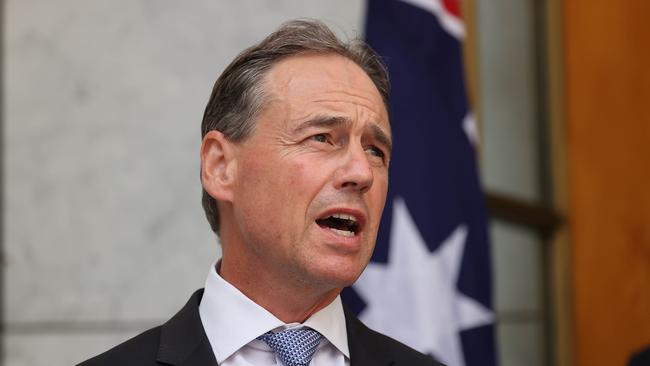Price cut on medical devices like hip and knee replacements could see health fund premiums reduced
Australians have been paying up to 110 per cent more for medical devices like hip and knee replacements. Now prices will be cut and will change health fund premiums.

National
Don't miss out on the headlines from National. Followed categories will be added to My News.
Private health insurers will face pressure to cut premiums after a Federal Government move to slash the cost of medical devices like hip and knee replacements by $900 million over the next three years.
Health Minister Greg Hunt said the deal with the medical technology industry would “improve the affordability and value of private health insurance for Australians by keeping downward pressure on premiums.”
Private patients have been paying 145 per cent more than public hospitals fork out for the exact same medical devices and it has been driving up health fund premiums.
Starting in July this year medical devices which cost seven per cent more than those in the public system will have their prices cut to bring the gap between the prices down by 40 per cent.
In July 2023 and again in July 2024 the gap between private and public prices will be reduced by a further 20 per cent each year.
By 2025 eight in ten medical devices supplied through private hospitals will have to be charged at a prices that is no more than seven per cent above the price of those supplied in the public system.

Health funds had made a record $2.4 billion in profits over the last two years and must now be forced to tighten their own belts, Medical Technology Association of Australia chief Ian Burgess said
Insurers must “cut their multi-million dollar ‘management fees’ and exorbitant executive benefits so that Australian families receive the full benefit of these cuts,” he said.
However, health funds which were excluded from the negotiations are sceptical the savings will ever be achieved and they were not involved in the negotiations over the cuts.
“These changes were made in consultation with foreign multi-national companies whose only objective is to make money,” Private Healthcare Australia chief Dr Rachel David said.
“We (health funds) would have preferred to have a seat at the table and we are still trying to understand the legal status of the changes,” she said.
A study commissioned by health funds found Australia’s private patients pay 40-110 per cent more for the top 68 most used medical devices compared to France, New Zealand and the United Kingdom.
Catholic Health Australia which provides 25 per cent of Australia’s private hospital care said health fund members could be facing huge out of pocket expenses under the changes.
Currently any medical device that is included in a list called the Prostheses List has to be covered by a health fund.
Under the changes, 400 miscellaneous items like surgical glues, adhesives and bandages will be removed from the Prostheses List and the reforms do not require health funds to pay for them.
Pat Garcia CEO of Catholic Health Australia said hospitals would have to pass these charges on to patients if health funds did not pay up.
“Private hospitals cannot absorb the additional hundreds of millions of dollars in costs so regrettably this means that they will be borne by patients who will face higher out of pocket expenses,” he said.



